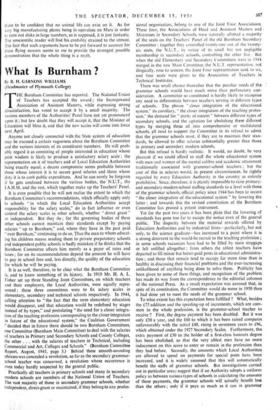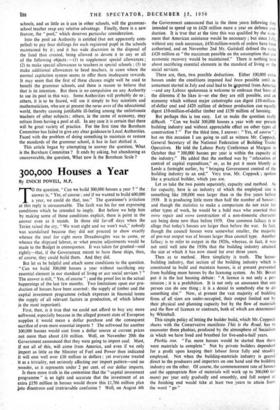What Is Burnham?
By B. H. GARNONS WILLIAMS (Headmaster of Plymouth College)
THE Burnham Committee has reported. The National Union of Teachers has accepted the award ; the Incorporated Association of Assistant Masters, while expressing strong dissatisfaction, has voted to accept it by a small majority. The various members of the Authorities' Panel have not yet pronounced upon it ; but few doubt that they will accept it, that the Minister of Education will bless it, and that the new scales will come into force next April.
Anyone not closely connected with the State system of education may be excused a certain vagueness about the Burnham Committee and the various interests of its constituent members. He will prob- ably regard it as consisting of °people interested in education whose joint wisdom is likely to produce a satisfactory salary scale ; the representation on it of teachers and of Local Education Authorities - being exactly equal, a decent compromise seems probable between those whose interest it is to secure good salaries and those whose duty it is to curb public expenditure. And he can surely be forgiven if he gets confused between the various bodies, the N.U.T., the I.A.H.M. and the rest, which together make up the Teachers' Panel.
It is even possible that he will not realise the extent to which the Burnham Committee's recommendations, which officially apply only to schools "in which the Local- Education Authorities accept responsibility for the salary scales," do in fact influence or even control the salary scales in other schools, whether "direct grant" or independent. But they do ; for the governing bodies of these other schools cannot maintain their standards except by paying salaries "up to Burnham," and, where they have in the past paid "over Burnham," continuing to do so. Thus the man to whom educat- ing his children means sending them to private preparatory schools and independent public schools is badly mistaken if he thinks that the Burnham Committee affects him merely as a payer of rates and taxes ; for on its recommendations depend the amount he will have to pay in school fees and, less directly, the quality of the education
for which he will be paying. _
It is as well, therefore, to be clear what the Burnham Committee is, and to know something of its history. In 1919 Mr. H. A. L. Fisher set up three Standing Joint Committees, on which teachers and their employers, the Local Authorities, were equally repre- sented; these three committees were to fix salary scales in elementary, secondary and technical schools respectively. In 1944, calling attention to "the fact that the term elementary education would disappear, and that education would be redefined by stages instead of by types," and postulating "the need for a closer integra- tion of the teaching profession corresponding to the closer integration in future of the educational system," the Coalition Government "decided that in future there should be two Burnham Committees, one Committee (Burnham Main Committee) to deal with the salaries
of teachers in Primary and Secondary Schools and County Colleges, the other . . . with the salaries of teachers in Technical, including Commercial and Art, Colleges and Schools." (Burnham Committee Report, August, 1945, page 3.) Behind these smooth-sounding phrases was concealed a revolution, so far as the secondary grammar- school teacher was concerned, a revolution whose occurrence is even today hardly suspected by the general public.
Practically all teachers in primary schools and many in secondary modern schools are members of the National Union of Teachers.
The vast majority of those in secondary grammar schools, whether independent, direct-grant or maintained, if they belong to any profes- sional organisation, belong to one of the Joint Four Associations. These four, the Associations of Head and Assistant Masters and - Mistresses in Secondary Schools, were naturally allotted a majority of the seats on the Teachers' Panel of the old Burnham Secondary Committee ; together they controlled twenty-one out of the twenty- six seats, the N.U.T., by virtue of its small but not negligible membership in secondary schools, controlling the other five. But when the old Elementary and Secondary Committees were in 1944 merged in the new Main Committee, the N.U.T. representation, not illogically, rose to sixteen, the Joint Four representation sank to six, and four seats were given to the Association of Teachers in Technical Institutes.
There was small chance thereafter that the peculiar needs of the :
grammar schools would have much more than perfunctory con- sideration. A committee so constituted is hardly likely to recognise any need to differentiate between teachers serving in different types
of schools. The phrase "closer integration of the educational system," its corollary, the closer integration of the teaching profes- sion," the demand for "parity of esteem" between different types of secondary schools, and the agitation for abolishing these different types by merging them all into comprehensive or multilateral schools, all tend to support the Committee in its refusal to admit that the grammar schools must, if they are to maintain their stan- dards, be allowed to offer salaries substantially greater than those in primary and secondary modern schools.
But this refusal is hardly realistic. It would, no doubt, be very pleasant if we could afford to staff the whole educational system with men and women of the mental calibre and academic attainment traditionally associated with grammar-school teachers ; but the cost of this in salaries would, in present circumstances, be rightly regarded by every Education A,uthority in the country as entirely prohibitive. Since, therefore, it is plainly impossible to raise primary- and secondary-modern-school staffing standards to a level with those, of the grammar schools, official policy since 1944 has been to secure "the closer integration of the•educational system" by lowering the latter ; and towards this the revised constitution of the Burnham Committee has proved a potent instrument.
Yet for the past two years it has been plain that the lowering of standards has gone too far to escape the notice even of the general public. The disparity between the material rewards offered by Education Authorities and by industrial firms—particularly, but not only, to the science graduate—has increased to a point where it is a strong deterrent to the would-be recruit to the teaching profession ; in some schools vacancies have had to be filled by mere stopgaps or left unfilled altogether ; from others the ablest teachers have departed to fill minor but better-paid posts in educational administra- tion; and those that remain tend to occupy far more time than is healthy in discussing their financial problems and the ever-increasing unlikelihood of anything being done to solve them. Publicity has been given to some of these things, and recognition of the problem has made its way from the correspondence to the editorial columns of the national Press. As a result expectation was aroused that, in spite of its constitution, the Committee would do more in 1950 than it had done yet to meet the needs of the grammar school.
To what extent has this expectation been fulfilled ? What, besides the 05 addition and the speeding-up of increments, which are com- mon to the whole profession, is the grammar-school teacher to
receive ? First, the degree payment has been doubled. But it was only £30 a year, and the £60 to which it has been raised compares
unfavourably with the initial £48, rising in seventeen years to £96, which obtained under the 1927 Secondary Scales. Furthermore, the extra payment of £30 to the holder of a first-class honours degree has been abolished, so that the very ablest men have no more inducement on this score to enter or remain in the profession than they had before. Secondly, the amounts which Local Authorities are allowed to spend on payments for special posts have been increased, and it is widely assumed that this will automatically benefit the staffs of grammar schools. But investigations carried out in particular areas suggest that if an Authority adopts a uniform policy as between various types of schools in calculating the amounts of these payments, the grammar schools will actually benefit less than the others ; only if it pays as much as it can in grammar schools, and as little as it can in other schools, will the grammar- school teacher reap any relative advantage. Finally, there is a new feature, the "pool," which deserves particular consideration.
Into the pool an Authority is entitled (but not apparently com- pelled) to pay four shillings for each registered pupil in the schools maintained by it ; and it has wide discretion in the disposal of the fund thus created, being allowed to devote it to any or all of the following objects: —(1) to supplement special allowances ; (2) to make special allowances to teachers in special schools ; (3) to Make additional allowances to head teachers, in cases where the normal capitation system seems to offer them inadequate rewards. It may seem that the first of these clauses might well be used to benefit the grammar schools, and there is reason to believe that that is its intention. But there is no compulsion on any Authority to use its pool in this way. Some Authorities will probably do so ; others, it is to be feared, will use it 'simply to buy scientists and mathematicians, who are at present the rarae ayes of the educational world, thereby causing justifiable ill-feeling among the unfortunate teachers of other subjects ; others, in the name of economy, may
refrain from having a pool at all. In any case it is certain that there will be great variety of practice. For the first time the Burnham Committee has failed to give any clear guidance to Local Authorities. Faced with the problem of doing something to maintain cir restore the standards of the grammar school, it has in fact shirked it.
This article began by attempting to answer the question, What is the Burnham Committee ? It ends by asking, but abandoning as unanswerable, the question, What now is the Burnham Scale ?







































 Previous page
Previous page